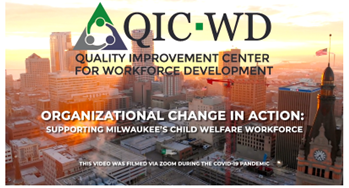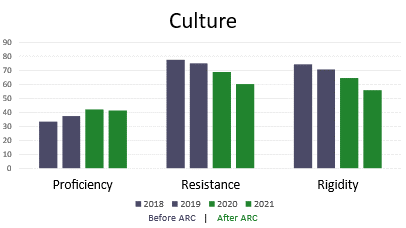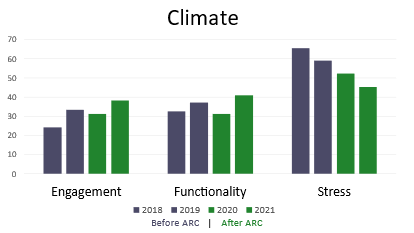Organizational Change Process
Organizational Change in Action
 The Division of Milwaukee Child Protective Services (DMCPS) is a state-operated child welfare system and is the only county system in Wisconsin run by the state. The Division is housed under the Department of Children and Families and has just under 200 staff, including: administrative/managerial staff, initial assessment and access (hotline) frontline workers, and fiscal and operations support. In 2016, DMCPS had an external turnover rate of 37% and they applied to be a Quality Improvement Center for Workforce Development (QIC-WD) site, with the goal of strengthening their child welfare workforce.
The Division of Milwaukee Child Protective Services (DMCPS) is a state-operated child welfare system and is the only county system in Wisconsin run by the state. The Division is housed under the Department of Children and Families and has just under 200 staff, including: administrative/managerial staff, initial assessment and access (hotline) frontline workers, and fiscal and operations support. In 2016, DMCPS had an external turnover rate of 37% and they applied to be a Quality Improvement Center for Workforce Development (QIC-WD) site, with the goal of strengthening their child welfare workforce.
When DMCPS started working with the QIC-WD, an Implementation Team was established to participate in an extensive needs assessment process, determine an intervention, and support implementation. The needs assessment took many months and the team found that most departures were due to resignations and retirements (65%) and that many staff left within the first 2 years. The average tenure of resignations was 1.6 years. Anecdotally, members of the Implementation Team indicated that retention seemed to stabilize when tenure hit the 3- to 4-year mark. To learn more about the workforce, the QIC-WD administered an Organizational Social Context (OSC) baseline survey. It showed that there were several aspects of both culture and climate that were in need of improvement, including:
- a hierarchical decision-making structure,
- high role conflict and change resistance among staff, and
- low sense of personal accomplishment and cooperation among staff.
The team developed a theory of change to demonstrate how various aspects of the organization’s culture and climate could be improved to positively impact worker satisfaction and practice. The Implementation Team selected the ARC (Availability, Responsiveness, Continuity) intervention to address their challenges and improve worker retention, as laid out in their logic model. The main purpose of ARC is to improve organizational culture and climate and the availability, responsiveness, and continuity of services in human service organizations. ARC is a proven intervention and was one of multiple organizational change interventions considered by the Implementation Team. It was selected based on input from the frontline workers, in part, because they felt it would give them a greater voice in the agency.
 This video highlights the experience of workers, supervisors, and administrators who were involved in ARC. |
The site began to implement ARC in 2019. They conducted an intervention kick-off meeting and began recruiting ARC team members. An ARC Specialist was brought in to train the teams, adapt the intervention to meet local needs, and provide support throughout implementation. ARC strategies build effective teams (of frontline workers and supervisors), and the approach uses continuous quality improvement steps to identify barriers to agency success. During these steps, teams use tools such as consensus decision-making and brainstorming to develop proposals to submit to the Organizational Action Team (OAT), comprised of agency leadership. This collaboration is designed to enhance the quality and network of relationships staff have within the agency, minimizing the hierarchical barriers that impacted communication across staff levels.
Since DMCPS began the intervention, six ARC teams (made up of 6-8 people per team) have each submitted a proposal to the OAT team. Proposals have addressed issues such as a domestic violence protocol and the use of an exception standard by supervisors (this standard allows cases to be closed quickly and the team did not think it was being applied consistently). Four proposals have been implemented so far. Team members reported the process of developing proposals and considering budget and other policy implications to be challenging; however, they also noted many positive elements of the experience, such as:
- A stronger voice in addressing barriers that impede effective job performance.
- Improved team meeting skills and processes to solve barriers alongside leadership.
- Improved communications, trust, and stronger relationships with team members, colleagues, and leadership.
- A more positive work setting (culture & climate) that enhances engagement, job satisfaction, and feelings of control.
The QIC-WD evaluation team administered the OSC in early 2018, 2019, 2020, and 2021. ARC began after the 2019 OSC administration, so the 2018 and 2019 results are prior to ARC (in purple, below), and the 2020 and 2021 results are post ARC (in green, below). The measures of culture and climate moved in the expected direction, indicating improvement in the organizational culture and climate over the course of the project.
 |
Culture: Shared behavioral expectations and norms that characterize and direct behavior in a work environment. Three dimensions are most predictive of human services outcomes:
|
 |
Climate: Shared employee perceptions regarding how their work environment impacts their own psychological well-being and functioning. Three dimensions are most predictive of human services outcomes:
|
The DMCPS intervention was generally well received by staff and leadership, although surveys and Implementation Team member feedback indicated that change is a difficult process. There were positive reports about how ARC brought worker voice to agency decision making, and the OSC survey indicated a decrease in organizational resistance and rigidity and an increase in perceptions of expected proficiency. These are all positive findings related to organizational culture. Similarly, worker engagement (sense of connectedness to families and efficacy in their role) and organizational functionality (clear expectations, cooperation among coworkers, and growth opportunities) improved over time, and worker stress (emotional exhaustion, role conflict, and role overload) decreased, which are positive findings related to organizational climate.
A key finding from the study was that the analysis of turnover data from 2016 (two years prior to QIC-WD involvement) to 2021 showed a decrease in overall turnover from 36.4% to 14.6%. DMCPS intends to continue using ARC to build relationships within the agency, bring worker voice to agency decision-making, and support a positive work environment.
All DMCPS resources summarized here can be found on the QIC-WD website.
For more information on ARC, contract Anthony Hemmelgarn, Ph.D., Organizational Development Consultant at ahemmelg@gmail.com.